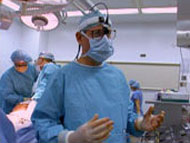We have all come to FitEyes in an effort to understand and do whatever we can to protect and nurture our eyes. Notwithstanding, some of us harbor fears that we may some day experience vision loss that may hamper or impact the quality of our lives. And some FitEyes members (or their loved ones) have already lost considerable sight.
Joseph Lovett, the filmmaker of Going Blind, understands first-hand what it is like to lose your sight because he has glaucoma, a disease that robs 4.5 million people worldwide of their vision. After years of slowly losing his sight, Joe decided to take action and began to investigate how people respond to vision-loss.
His search began small, with people he met on the streets of his hometown New York City and gradually lead him to places and people of all different ages and backgrounds around the United States. Each tells a fascinating story about dealing with the vision loss caused by sight-robbing diseases, infections and accidents. As a filmmaker, Joe uses the tool he knows best to gather information, to connect with individuals and to find answers to share with the world. The film is scheduled for airing nationally on PBS and elsewhere this October.
Joe has accompanied the film around the globe to increase public awareness of sight loss and low vision issues. Joe has been committed to raising awareness of critical health issues and advocacy throughout his career. He produced the first in-depth AIDS investigations for national television at ABC News 20/20.
He later created In A New Light (ABC, 1992-96), an annual AIDS outreach and entertainment special. Joe’s continuing work against AIDS won him The AIDS Action Foundation AIDS Leadership Award. In 2001, Joe won a Peabody Award and an Emmy nomination for writing, producing and directing HBO’s Cancer: Evolution to Revolution. Joe has produced over 35 hours of programming for prime time television and award-winning independent films that inform, inspire and compel people into action.
Joe has graciously agreed to participate in the next of our series of FitEyes teleconferences. He will discuss his film and also share his personal experience participating in an experimental neuro-stimulation treatment trial in Germany conducted by EBS Technologies. EBS is testing a non-invasive brain stimulation device for the treatment of visual field deficits that result from stroke, brain trauma and glaucoma. A prototype has been tested in clinical trials, with more than 1,000 patients in observational studies. Joe has had 3 courses of EBS NEXT WAVE therapy during the past 21 months and is willing to answer your questions about this experience.



